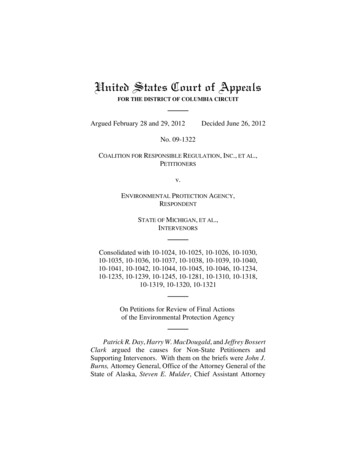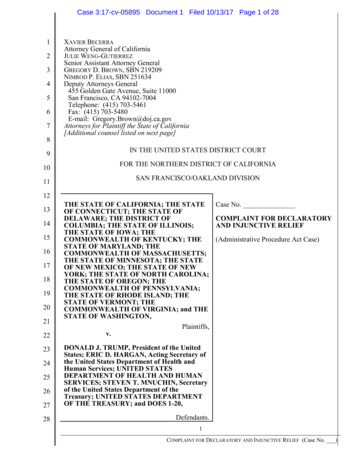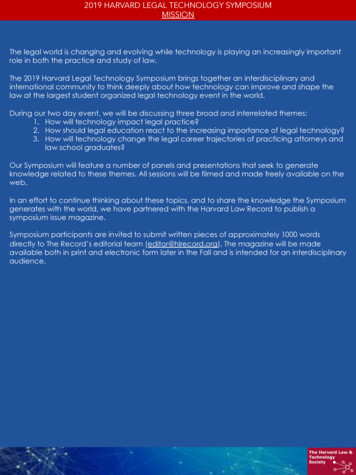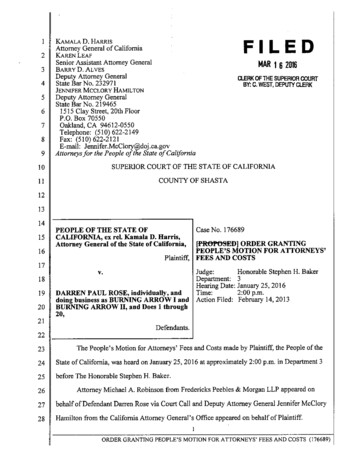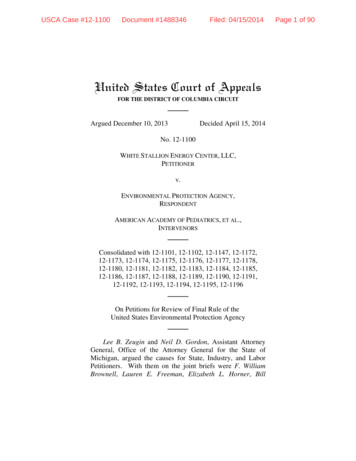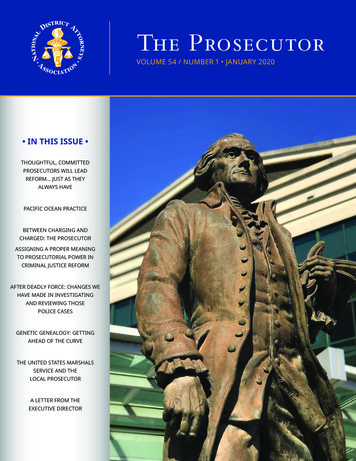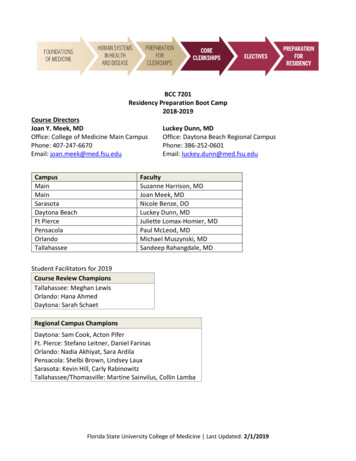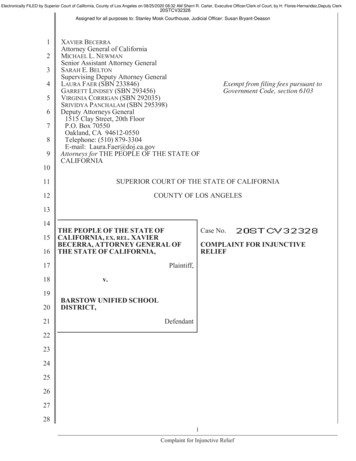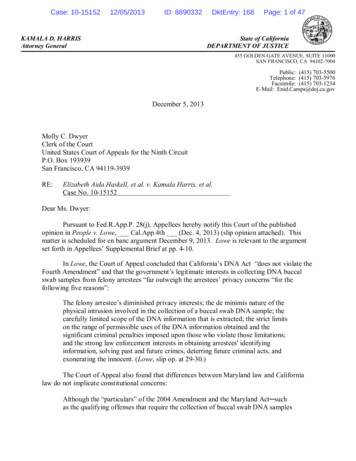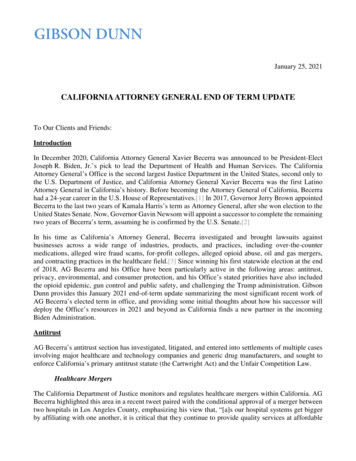
Transcription
January 25, 2021CALIFORNIA ATTORNEY GENERAL END OF TERM UPDATETo Our Clients and Friends:IntroductionIn December 2020, California Attorney General Xavier Becerra was announced to be President-ElectJoseph R. Biden, Jr.’s pick to lead the Department of Health and Human Services. The CaliforniaAttorney General’s Office is the second largest Justice Department in the United States, second only tothe U.S. Department of Justice, and California Attorney General Xavier Becerra was the first LatinoAttorney General in California’s history. Before becoming the Attorney General of California, Becerrahad a 24-year career in the U.S. House of Representatives.[1] In 2017, Governor Jerry Brown appointedBecerra to the last two years of Kamala Harris’s term as Attorney General, after she won election to theUnited States Senate. Now, Governor Gavin Newsom will appoint a successor to complete the remainingtwo years of Becerra’s term, assuming he is confirmed by the U.S. Senate.[2]In his time as California’s Attorney General, Becerra investigated and brought lawsuits againstbusinesses across a wide range of industries, products, and practices, including over-the-countermedications, alleged wire fraud scams, for-profit colleges, alleged opioid abuse, oil and gas mergers,and contracting practices in the healthcare field.[3] Since winning his first statewide election at the endof 2018, AG Becerra and his Office have been particularly active in the following areas: antitrust,privacy, environmental, and consumer protection, and his Office’s stated priorities have also includedthe opioid epidemic, gun control and public safety, and challenging the Trump administration. GibsonDunn provides this January 2021 end-of-term update summarizing the most significant recent work ofAG Becerra’s elected term in office, and providing some initial thoughts about how his successor willdeploy the Office’s resources in 2021 and beyond as California finds a new partner in the incomingBiden Administration.AntitrustAG Becerra’s antitrust section has investigated, litigated, and entered into settlements of multiple casesinvolving major healthcare and technology companies and generic drug manufacturers, and sought toenforce California’s primary antitrust statute (the Cartwright Act) and the Unfair Competition Law.Healthcare MergersThe California Department of Justice monitors and regulates healthcare mergers within California. AGBecerra highlighted this area in a recent tweet paired with the conditional approval of a merger betweentwo hospitals in Los Angeles County, emphasizing his view that, “[a]s our hospital systems get biggerby affiliating with one another, it is critical that they continue to provide quality services at affordable
prices to the families that count on them in times of crisis.”[4] In October 2019, the CaliforniaDepartment of Justice issued a letter denying a proposed partnership between Adventist System/Westand St. Joseph Health System on the grounds that the merger might increase costs or limit access tohealth care services.[5] Similarly, in August 2020, AG Becerra announced a settlement with VerityHealth System of California, Inc., and Prime Healthcare Services, Inc., that imposed additionalconditions on the sale of St. Francis Medical Center in Los Angeles.[6] The settlement required Primeto provide additional funding for charity care and community benefit services.[7] Aiming to expand hisauthority in this sphere, AG Becerra also supported SB 977, which would expand the Attorney General’sauthority to review certain transactions, such as acquisitions or change-of-control transactions, involvinghealth care facilities.[8] The bill, which has already passed the state Senate, also authorizes the AttorneyGeneral to file civil suits to slow hospital mergers under certain circumstances.Sutter HealthThis longstanding case, along with the parallel class action lawsuit on behalf of self-managed healthcareplans, against Sutter Health was announced to have reached a settlement on December 19, 2020.[9]Under the terms of the settlement, Sutter Health would pay 575 million to the plaintiff class and agreedto end practices that the private plaintiffs and California Attorney General alleged stifled competition,such as all-or-nothing contracting deals and patient steering practices. Sutter would also be required tolimit what it charged patients for out-of-network services, increase its transparency on pricinginformation, and limit the bundling of certain services. A provision within the settlement required that amonitor be established to ensure Sutter abide by the settlement terms. In June 2020, Sutter Healthattempted to delay final approval of the settlement due to catastrophic losses stemming from the COVID19 pandemic.[10] On July 9, 2020, the court ultimately denied Sutter’s motion to delay the finalsettlement hearing, which would take place in August. As of the publishing of this alert, the court hadrejected the proposed settlement and sent the proposal back to the parties in order to select a monitorwith a more diverse background. This case is just one of the many now being handled by AG Becerra’snew Healthcare Rights and Access Section, which is charged with increasing and protecting theaffordability, accessibility, and quality of healthcare in the State of California including healthcare andprescription drug marketing, nonprofit healthcare transactions, alleged violations of antitrust laws in thehealthcare context, and healthcare privacy and healthcare civil rights, such as reproductive rights andLGBTQ healthcare-related rights.GoogleThis year, in July 2020, it was reported that the Office had launched an antitrust investigation intoGoogle—and had declined to join in either of the two ongoing investigations involving 48 other stateattorneys general.[11] The investigation follows both the ongoing state AG investigations as well asother publicly announced investigations by federal prosecutors and Congressional subcommittees. OnJuly 11, 2020, AG Becerra filed to join the Department of Justice’s antitrust suit against Google, whichalleges that Google violated antitrust laws by entering into exclusionary business agreements that shutout competitors and suppressed innovation.[12]2
While the various investigations have not concluded, this recent action may signal the Office’s furtherinterest in policing alleged anticompetitive conduct under novel interpretations of the Cartwright Actand Unfair Competition Law.Generic DrugsAG Becerra reached settlement agreements with three pharmaceutical companies (Teva, Endo, andTeikoku) for allegedly entering into so-called “pay-for-delay agreements,” wherein brand-name drugcompanies compensate generic drug manufacturers for not introducing a generic version of a brandname drug for some period of time in order to avoid unnecessary and burdensome litigation costs.[13]In addition to these alleged “pay for delay” and other price fixing conspiracies,[14] AG Becerra wasinstrumental in pushing through AB 824, which was signed into law by Governor Newsom in October2019. The law increases antitrust scrutiny of patent settlement agreements between branded and genericpharmaceutical manufacturers. Not only does the law cover the traditional “pay-for-delay” agreementunder the Hatch-Waxman Act, but it also covers settlements brought under the Biologics PriceCompetition and Innovation Act (BPCIA). The California Attorney General’s Office is granted specificenforcement capabilities under the new law but has yet to bring any enforcement action under AB 824.It has been reported that AG Becerra is investigating various pharmaceutical companies over a multitudeof drugs.For more information on AB 824, please find a detailed client alert prepared by Gibson Dunn here.T-Mobile/Sprint MergerLast year, AG Becerra, along with New York Attorney General Letitia James, led a coalition of fourteenstates that unsuccessfully sued to enjoin the merger between T-Mobile and Sprint.[15] The trial was anuphill battle as the Department of Justice and the Federal Communications Commission approved theproposed merger, with qualifications, before the trial started. As part of the efforts to gain the federalgovernment’s approval to the merger, T-Mobile and Sprint agreed to set up satellite TV company Dishas a new cellular competitor. The coalition of states, however, argued this was not an adequatereplacement for Sprint. Additionally, the state AGs alleged that the merger would harm consumers byreducing competition in the shrinking wireless telecommunications market and result in higher pricesand/or reduced services.[16] Ultimately, a New York federal judge disagreed with the states and allowedthe merger to close.[17] Under previously agreed-to settlement terms with various states that individuallysettled, T-Mobile agreed to reimburse the state-led working group 15 million and agreed to providevarious consumer benefits such as freezing prices in California for five years and offering free internetand Wi-Fi hot spots to low-income households.In a statement made after the defense verdict was announced, one of the attorneys from the CaliforniaAttorney General’s Office stated that moving forward, the Office may not “put too much faith in theeconomics,” noting that she believed the decision did not consider the complicated economic theory andmodels put forth by the States.[18] “The economics went out the window, so anyone that comes in totalk to [the California Attorney General] needs more than just an economic story.”[19]3
EmploymentThe Office appeared as an amicus in support of employees in labor actions. In Bernstein v. VirginAmerica, Inc., the district court awarded a class of flight attendants 77 million.[20] The court foundthat Virgin America was subject to California’s labor laws, both as to work done in California and basedon employment policies decided from Virgin’s California headquarters, and that the plaintiff flightattendants had been undercompensated.[21] (Virgin’s meal break policy was not centralized, so mealbreak violations that happened outside California were not covered.) The Office appeared when Virginappealed to the Ninth Circuit. The Office’s amicus brief in support of the flight attendants focused onCalifornia’s state labor policy and laws and argued that certain aspects of California’s labor laws are notpreempted by federal law. Although the Ninth Circuit has not yet issued its decision in this case, it offersyet another example of how AG Becerra, apart from his enforcement authority, inserted himself intoprivate litigation to advance a regulatory agenda.AG Becerra, however, has not limited himself to amicus briefs. Recently, the Office became involved inlitigation related to employee classification. In December 2019, AG Becerra announced an 800,000settlement with Infosys stemming out of allegations that Infosys claimed that some of its foreign workerswere covered by B-1 visas as opposed to H-1B visas.[22] H-1B visas, unlike B-1 visas, are subject topayroll taxes and require employers to pay workers at the prevailing local wage. The suit, brought underboth California’s False Claims Act and Unfair Competition Law, demonstrated the range of legalapproaches that AG Becerra has been willing to deploy, by seeking to enforce California’s labor lawseven though such laws are primarily the province of the Labor Commissioner.AG Becerra also moved to enforce AB 5, a recently enacted California statute that codifies the so-called“ABC test” for determining whether a worker is an employee or an independent contractor.[23] OnMay 5, 2020, the Office, along with the City Attorneys of Los Angeles, San Diego, and San Francisco,filed suit against rideshare companies, alleging violations of both California’s Unfair Competition Lawand the Labor Code, even though Labor Code enforcement is traditionally the province of the LaborCommissioner.[24] Becerra sought injunctive relief under AB 5, seeking reclassification of ridesharedrivers as employees and not independent contractors.[25] Becerra also sought restitution for drivers andcivil penalties for alleged violations under the Unfair Competition Law.Despite these enforcement efforts, California voters overwhelmingly approved Proposition 22 in theNovember election, passing it by the largest margin of any ballot initiative that year. Proposition 22exempts app-based workers from AB 5 and definitively classifies them as independent contractors solong as basic guarantees of driver independence are satisfied. Proposition 22 can be seen as a rebuke ofthe Attorney General and City Attorneys’ attempt to stifle worker independence, and the outcome of theOffice’s and City Attorneys’ suit may serve as a bellwether for future enforcement as to workers whodo not fall within the Prop 22 exemption. If AG Becerra’s successor succeeds in using the UnfairCompetition Law to enforce Labor Code provisions he lacks authority to directly enforce, this may signalmore aggressive enforcement of the labor laws in the future, including the provisions of Prop 22.Beyond AB 5, AG Becerra also obtained several employment-related settlements. In March 2020, he,along with other state attorneys general, announced three agreements with Burger King, Popeyes, and4
Tim Hortons in which they agreed to stop including “no-poach” provisions in their U.S. franchiseagreements.[26] These follow similar settlements with Arby’s, Dunkin’, Five Guys, and Little Caesarsin 2019,[27] and were part of AG Becerra’s attack on non-competes and similar agreements.[28]EnvironmentalShortly after winning election, in 2018 AG Becerra announced the creation of an Environmental JusticeBureau within the Environment Section of the California Department of Justice.[29] Charged with“protect[ing] people and communities that endure a disproportionate share of environmental pollutionand public health hazards,” the Bureau launched investigations and actions seeking to recover damagesfor and abatement of alleged violations, including allegedly contaminated drinking water, purportedexposure to lead and other toxins in the environment and consumer products, and claimed discharges toair and water.In addition to the Office’s wide-ranging challenges to Trump administration environmental policies, AGBecerra coordinated with local district and city attorneys to secure a settlement with Autozone overallegations of improper waste disposal.[30] The settlement required Autozone to submit to a range ofaudits of its trash receptacles, prohibited unlawful waste, and required payment of 11 million to dozensof district attorneys’ offices throughout the state, including nearly a million dollars directly to his ownOffice.[31]AG Becerra also lent the support of his Office to municipalities’ ongoing lawsuits against energycompanies through his amicus submissions. In March 2019, the Office filed an amicus brief in the NinthCircuit supporting Oakland and San Francisco in their suit against several major energy companies.[32]Oakland and San Francisco had sued the defendant energy companies for alleged injuries from sea-levelrise induced by global warming. Opposing federal removal, the Office’s brief emphasized the need forstate courts to be able to adjudicate climate-change related claims brought by state politicalsubdivisions.[33] Similarly in July 2020, the Office filed a brief in support of an Oakland ordinanceprohibiting the storage and handling of coal and petroleum coke within city limits.[34] The Office briefclaimed broad authority of the State and municipalities to regulate activities that may contribute toclimate change.[35] While his Office supported these suits, the Attorney General did not bring any suchsuits himself.False Claims ActUnder AG Becerra, the Office’s False Claims Unit has investigated and prosecuted alleged overchargesby private companies to State agencies and pension funds, with some actions dating back more than adecade. One area of particular False Claims Act focus over the past decade, which continued during AGBecerra’s term, has been the recovery of investment losses suffered by California’s public pension fundsduring the 2008 financial crisis. In December 2017, AG Becerra announced a 120 million settlementwith Royal Bank of Scotland (RBS), over alleged misrepresentations about residential mortgage-backedsecurities sold to California’s public employee and teacher pension funds.[36] In April 2019, the Officeannounced a 150 million settlement with Morgan Stanley for allegedly failing to provide adequatedisclosures for mortgage-backed securities sold to those same pensions from 2003 to 2007.[37] The5
Office has pursued other pension-related False Claims Act cases, including a recent 7 million settlementwith HSBC for alleged foreign currency trading overcharges to the California Public EmployeesRetirement System (CalPERS) in 2008 and 2009.[38] The Office has also participated in multi-state andfederal Medicaid-related False Claims Act cases, including most recently a 40 million dollarnationwide settlement with Apria Healthcare over Medicaid reimbursements for ventilation machinesthat allegedly were unnecessary.[39]Other recent settlements include a 102 million settlement with BP Energy Company over allegednatural gas contract overcharges dating from 2003 to 2012, which originated as a qui tam suit broughtby a former employee and in which the Office intervened[40]; and a 4 million settlement with VMwarefor alleged overcharges to the State and local governments for information technology software spanninga period of six years.[41] Finally, AG Becerra has been a vocal supporter of legislation that wouldbroaden the scope of the False Claims Act. In 2019 and 2020, he sponsored legislation that would haveexpanded the statute to cover tax fraud—creating a whole new class of claims for which private plaintiffscould profit through qui tam actions and for which the Attorney General could obtain treble damagesand civil penalties. Each attempt to date has failed to pass in the Legislature despite Democraticmajorities in both the Assembly and the Senate, due to significant concerns about creating financialincentives for private plaintiffs to file predatory qui tam lawsuits against unsuspecting businesses, andthe potentially devastating financial cost associated with responding to even frivolous claims.Nevertheless, the bills’ author, Assembly Member Mark Stone, is expected to continue to attempt toexpand the statute to cover tax claims.[42]HealthcareIn addition to the Office’s activity regulating healthcare mergers and alleged price-fixing agreementsdiscussed above, AG Becerra obtained substantial awards based on allegedly deceptive marketing ofcertain health care products. In January 2019, AG Becerra announced a 120 million nationwidesettlement—of which California will receive 8 million—with Johnson & Johnson related to purportedmisrepresentations as to the effectiveness and safety of hip implants devices.[43] In November 2019, theOffice (along with the Los Angeles District Attorney and Los Angeles County Counsel) filed suit againstJUUL Labs, for allegedly marketing and selling electronic cigarettes to minors.[44] And, in January2020, the Office secured a 344 million judgment after a trial against Johnson & Johnson for deceptivemarketing related to its pelvic mesh for women.[45]Along the same lines, in late 2017, numerous pharmaceutical companies announced in public filings thatthe California Attorney General’s Office, along with other state attorneys general and federal prosecutingand enforcement agencies, were investigating the pricing and sales of insulin, which had increased inprice over the preceding decade.[46] AG Becerra also recently announced a 11.8 million settlementwith Novartis Pharmaceuticals, covering alleged violations of California’s False Claims Act as well asthe federal False Claims Act and Anti-Kickback Statute related to the provision of various drugs toMedicare and Medi-Cal patients.[47]6
Privacy and CybersecurityThe Attorney General’s Office has long been active in investigating and prosecuting companies for databreaches that exposed consumers’ personally identifiable information. For example, over the last twoyears, the Office has announced various multi-million dollar settlements arising out of data breaches,including against large health insurance and retail companies for allegedly failing to maintain adequatedata security measures.[48] In September 2020, the Attorney General’s Office also secured a settlementagainst an app developer in which no breach was alleged, but in which the design of the app was allegedto pose risks to the personal information of app users.[49]During this time period, California’s privacy landscape also witnessed a sea change with the passage oftwo recent statutes: the California Consumer Privacy Act (“CCPA”), which went into effect onJanuary 1, 2020 (and which the California Attorney General has been empowered to enforce as of July 1,2020),[50] and the California Privacy Rights Act (“CPRA”), which California’s voters approved in theNovember 2020 general election. AG Becerra and his Office stand to play a pivotal role in theirenforcement in the coming years.Even before it was empowered to enforce the CCPA, the Office was vested with the duty under thatstatute to draft its implementing regulations—essentially, creating the regulations it would then enforce.The Office announced on June 1, 2020 that those regulations had been submitted to the California Officeof Administrative Law,[51] which issued the final text of the regulations on August 14, 2020. At thattime, the final regulations became enforceable.[52] To execute its enforcement power, the Office has theauthority to bring a civil action for any violation of the CCPA, and can seek to impose civil penalties ofup to 2,500 per violation or 7,500 per intentional violation (or violation involving a minor’s personalinformation). Beyond reports of compliance letters being issued by the Office, to date, no enforcementactions have been brought by the Office under the CCPA.The CPRA is an initiative statute that was placed on the November 3, 2020 ballot and was passed by thevoters. The CPRA amends the CCPA to clarify and broaden it, and imposes a January 1, 2023 deadlinefor businesses to come into compliance with the new CPRA provisions.[53] The Office preserves itsauthority to issue CCPA regulations during part of the time period before CPRA takes effect, until a newprivacy agency, the California Privacy Protection Agency (“CPPA”)—the first enforcement agency inthe United States focused solely on privacy—would be formed with its own rulemaking authority.[54]While the composition of the CPPA has not yet been announced, it is likely that at least some of its staffwill come from the California Attorney General’s Office. The Office will continue to be tasked withenforcing the CCPA until January 1, 2023, at which time the California Privacy Protection Agency andthe Office will have parallel authority to enforce the CPRA (CPPA from an administrative enforcementstandpoint, and the Office maintaining its civil action enforcement authority). The CPRA containsvarious additional provisions governing the two enforcement bodies’ interactions and detailing theirenforcement powers.For more information on the CCPA or the CPRA, find Gibson Dunn Client Alerts here, here, and here.7
Looking Forward Into 2021 and BeyondCalifornia’s Constitution provides that the Governor fills any vacancy in the office of the AttorneyGeneral, to complete the remainder of the existing term, by nominating a candidate who must beconfirmed by a majority of the state Assembly and state Senate.[55] Unlike other statewide offices suchas Secretary of State, the Attorney General must be admitted to the California Bar, and for at least fiveyears immediately preceding his or her appointment or election to that Office.[56] Numerous potentialcandidates have been named, and we expect Governor Newsom to consider carefully Becerra’sreplacement as one piece of the larger reshuffling of California’s highest elected offices, which includesthe appointment of Secretary of State Alex Padilla to replace Vice-President-Elect Harris in the U.S.Senate, and the appointment of Assemblywoman Shirley Weber to replace Padilla in his prior role. It islikely that Governor Newsom will announce his choice for Attorney General once Becerra is confirmedby the U.S. Senate.Regardless of who Governor Newsom appoints to replace AG Becerra, we expect the next two years tolook directionally similar to Becerra’s term. The incoming Biden Administration (including AG Becerrahimself at the helm of the Department of Health and Human Services) will undoubtedly result in a shiftin the Attorney General’s priorities. We expect to see litigation against the federal government to take aback burner as the Biden Administration rolls-back and ceases enforcement of Trump-era policies, andimplements new policies that are more aligned with California’s elected officeholders. We also expectto see the Attorney General partner with federal agencies, including the Department of Justice, FederalTrade Commission, Environmental Protection Agency, and Consumer Financial Protection Bureau onvarious initiatives. As a result, the change in the occupant at the White House will likely shift theAttorney General’s focus away from challenging federal actions and toward greater litigation againstprivate actors within California. The Office’s aggressive enforcement positions on antitrust, consumerprotection, environmental, and labor issues, for example, are unlikely to change in the coming monthsand will require that companies pay careful attention to the incoming statements and actions of the newAttorney General—including the potential reshuffling of the Office’s senior leadership. The Office willlikely continue to look for and seize upon opportunities in a broad range of areas.[1] https://xavierbecerra.com/about/[2] Numerous candidates have been mentioned in media reports as to possible replacements, and thepotential field remains wide open. As of mid-January 2021, some of the reported potential candidatesinclude Assembly member Rob Bonta, Contra Costa County District Attorney Diana Becton, SanFrancisco City Attorney Dennis Herrera, and California Supreme Court Justice Goodwin Liu.[3] Id.[4] @AGBecerra, Twitter, 148867 (Dec. 10,2020).8
[5] Press Release, Cal. Attorney General, California Department of Justice Denies Transactionbetween Adventist Health and St. Joseph Health Systems (Oct. 31, 2019), available entist-health-and-st.[6] Press Release, Cal. Attorney General, Attorney General Becerra Reaches Settlement with VerityHealth on Conditions of Transfer of St. Francis Medical Center (Aug. 14, 2020), available nditions-transfer-st.[7] In re Verity Health Sys. of Cal., Inc., No. 2:18-bk-20151-ER (C.D. Cal. Aug. 31, 2020)(Stipulation).[8] Press Release, Cal. Attorney General, Attorney General Becerra and Senator Monning AnnounceThat Legislation to Reduce Healthcare Costs, Increase Access to Affordable Care Passes SenateHealth Committee (May 13, 2020), available at ion-reduce.[9] Lesley Stahl, 60 Minutes, How a Hospital System Grew to Gain Market Power and Drove UpCalifornia Health Care Costs (December 13, 2020), available -2020-12-13/.[10] Robert King, Fierce Healthcare, Sutter Health Seeks Delay of 575M Settlement to Assess Impactof COVID-19 (June 17, 2020), available at -covid-19.[11] Leah Nylen, Politico, California Investigating Google for Potential Antitrust Violations (July 9,2020), available at a-google-anti-trustinvestigation-355710.[12] Press Release, Cal. Attorney General, Attorney General Becerra Moves to Join Federal LawsuitAgainst Google for Anticompetitive Actions (December 11, 2020), available google.[13] Press Release, Cal. Attorney General, Attorney General Becerra Secures Nearly 70 Millionagainst Several Drug Companies for Delaying Competition and Increasing Drug Prices (July 29,2019), available at eral-drug.[14] See Press Release, Cal. Attorney General, Attorney General Becerra Joins Price-Fixing LawsuitAgainst Six Drug Companies (March 1, 2017), available at x-drug-companies.9
[15] State of New York et al. v. Deutsche Telekom AG et al., No. 1:19-cv-05434 (June 11, 2019S.D.N.Y.)[16] Id. (Complaint) at Dkt. 2.[17] Id. (Complaint) at Dkt. 410.[18] Matthew Perlman, Law360, Calif. Enforcer Sees Less Focus On Economics After T-Mobile (Sept.10, 2020), available at 9] Id.[20] Bernstein v. Virgin America, Inc., No. 15-cv-02277-JST, Doc. No. 365 (N.D. Cal. Jan. 16, 2019).[21] Bernstein v. Virgin America, Inc., No. 15-cv-02277-JST, Doc. No. 97 (N.D. Cal. Jan. 5, 2017).[22] Press Release, Cal. Attorney General, Attorney General Becerra Announces 800,000 SettlementAgainst Infosys for Misclassification of Foreign Workers and Tax Fraud (Dec. 17, 2019), available athttps:/
Sutter Health. This longstanding case, along with the parallel class action lawsuit on behalf of self -managed healthcare plans, against Sutter Health was announced to have reached a settle 19, 2020. [9]ment on December Under the terms of the settlement, Sutter Health would pay 575 million to the plaintiff class and agreed

